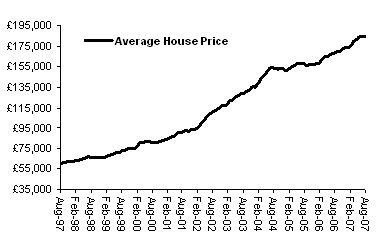Financial market turmoil poses risks for the housing market
- House prices are unlikely to be significantly hit by market turmoil in the short term
- But dependence of UK economy on financial services poses a longer term risk
- Unexpectedly low inflation and financial market unrest has reduced the risk of a Bank Rate rise to 6%
Headlines |
August 2007 |
July 2007 |
Monthly index * Q1 '93 = 100 |
365.7 |
363.5 |
Monthly change* |
0.6% |
0.1% |
Annual change |
9.6% |
9.9% |
£183,898 |
£184,270 |
* seasonally adjusted
Commenting on the figures Fionnuala Earley, Nationwide's Chief Economist, said:
“The rate of house price growth lifted a little during August, but the annual rate continues to moderate. Prices increased by 0.6% during the month, but the annual rate fell to 9.6% down from 9.9% in July. A typical UK property cost an average of £183,898 in August, £16,177 more than one year ago.
Financial market volatility unlikely to affect UK house prices in the short term…
“The US sub-prime crisis has created turmoil in international financial markets, but this is unlikely to have a significant additional effect on the rate of growth of house prices in the UK in the short term. We still expect house price growth in 2007 to come in close to the middle of our forecast range of between 5% and 8%. The expected slowing results from three main factors, each of which have been around for some time. First, weaker affordability, as house prices continue to grow more quickly than earnings; second the effect of higher interest rates and inflation on consumers’ pockets; and third lower house price expectations.
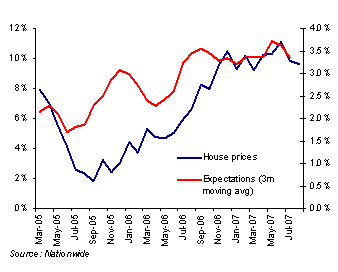
Sales to stock ratio and house prices, %
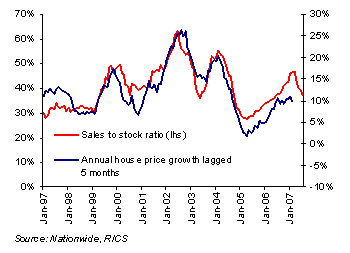
“While it has taken some time for these factors to bite, there are now clearer signs of slower demand in the market reflected in the collapse in new buyer enquiries. In addition, the stock-to-sales ratio, which leads house price inflation by five to seven months, predicts a continued slowing in the annual rate of house price inflation.
…but there are risks
Growth of financial intermediation output in Q1 2007
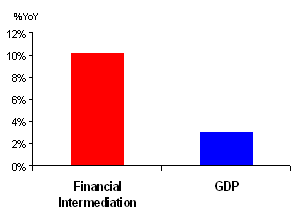 “Whether the fall out from the US sub-prime crisis will have a more severe impact on the housing market longer term will depend on how long it takes for market jitters to settle. A prolonged financial market downturn would be uncomfortable for the overall economy given the importance of this sector to economic growth over several years. Such a downturn would not only affect investment bankers, but would also have negative knock-on effects for legal, accountancy and other professional services that have benefited from the structured credit boom. On top of this, jobs in restaurants, cafes and other services catering for city workers would also be affected. The impact on London property prices can only be negative compared to the current situation, particularly at the top end, but employment generated from Olympic and other infrastructure investment along with supply issues will remain positive factors for the mainstream market.
“Whether the fall out from the US sub-prime crisis will have a more severe impact on the housing market longer term will depend on how long it takes for market jitters to settle. A prolonged financial market downturn would be uncomfortable for the overall economy given the importance of this sector to economic growth over several years. Such a downturn would not only affect investment bankers, but would also have negative knock-on effects for legal, accountancy and other professional services that have benefited from the structured credit boom. On top of this, jobs in restaurants, cafes and other services catering for city workers would also be affected. The impact on London property prices can only be negative compared to the current situation, particularly at the top end, but employment generated from Olympic and other infrastructure investment along with supply issues will remain positive factors for the mainstream market.
After the floods, out come the doves
“The overall extent of any damage to economic growth and hence the housing market will depend on the length of the credit crunch and the monetary policy response by the Bank of England. August’s Inflation Report signalled that a rise in the Bank Rate to 6% was pretty much a certainty. But the Bank’s forecast of inflation did not predict a dip below the 2% target at any point over the next two years, even based on market rates rising to 6%. So, the fall in inflation to a sub-target 1.9% in July will have come as a surprise. On top of this, news from Europe suggests that the economies of the UK’s main trading partners are weakening, while the likelihood of a slowdown in the States is rising all the time. The MPC has been highlighting the strength of global and Eurozone growth as a factor supporting its tightening campaign. This, together with the softer tone of the last set of MPC minutes, which revealed that most Committee members “had no firm views on whether rates would need to rise further”, has led us to believe that rates will now remain at 5.75%.
“The turmoil in credit markets strengthens the case of the doves on the Committee as the MPC will be reluctant to do anything to add uncertainty while the markets remain volatile. The Bank of England’s reluctance to intervene in the markets in the same way as the Fed and the ECB suggests that at the moment it is fairly sanguine about the lasting effects of the credit crunch. But the longer the squeeze continues, the more likely it is to have a dampening effect on the wider economy and hence the outlook for house price growth next year.”
Fionnuala Earley Katie Harper
Chief Economist Media Relations Manager
Tel: 01793 656370 Tel: 01793 656215
Mobile: 07985 928029 Mobile: 07764 234893
Average UK House Price
Long Term Real House Price Trend
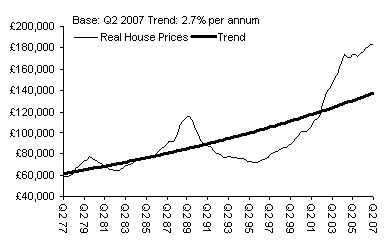
Annual % Change in House Prices
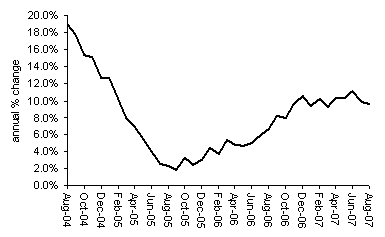
3 months on previous 3 months % change
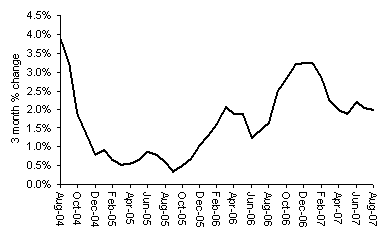
Notes:
Indices and average prices are produced using Nationwide's updated mix adjusted House Price Methodology which was introduced with effect from the first quarter of 1995. Price indices are seasonally adjusted using the US Bureau of the Census X12 method. Currently the calculations are based on a monthly data starting from January 1991. Figures are recalculated each month which may result in revisions to historical data.
The Nationwide Monthly House Price Index is prepared from information which we believe is collated with care, but no representation is made as to its accuracy or completeness. We reserve the right to vary our methodology and to edit or discontinue the whole or any part of the Index at any time, for regulatory or other reasons. Persons seeking to place reliance on the Index for their own or third party commercial purposes do so entirely at their own risk. All changes are nominal and do not allow for inflation.
Think carefully before securing other debts against your home, your home may be repossessed if you do not keep up repayments on your mortgage.
Go Direct.co.uk is a trading style for website purposes of Go Direct UK Ltd.
Go Financial Services is a trading style of Go Direct UK Ltd which is an appointed representative of Personal Touch Financial Services Ltd which is authorised and regulated by the Financial Conduct Authority. Registered in England & Wales Company 5703224. FCA Number 456600
We normally do not charge a fee for mortgage advice, however this is dependent on your circumstances. Our typical fee would be £349





